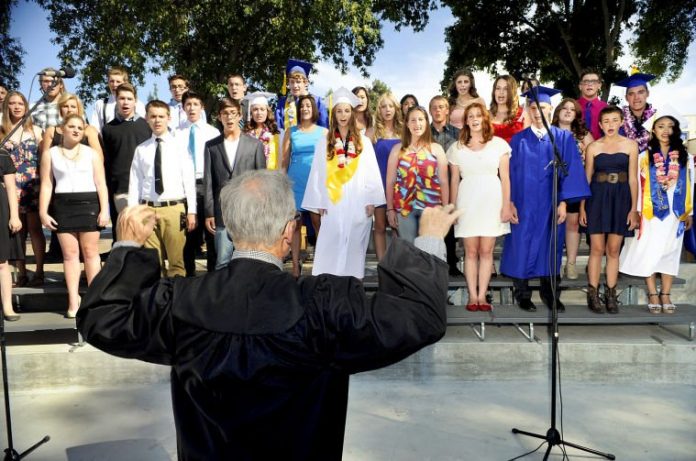
Dear Editor,
I’d like to ask those opposed to Gilroy Unified School District’s decision not to allow school choirs to perform in churches, to really look into their hearts and ask themselves, “Do I really object to this decision because the choirs lack a venue with adequate acoustics?” or is the real issue that “I want the kid’s choir to appear in my church.”
It’s important because solving the problem requires really identifying what the problem is.
I suspect most people’s reason is really that they want the choir to visit their church, but since that isn’t a socially acceptable, politically correct reason, they complain about “acoustics”.
Let’s look at this dispassionately. The school district can’t endorse school choirs singing in churches because it would cause an unmanageable morass of legal exposure. The choir sings in church A because the venue has great acoustics; now church B who meet in a rented warehouse complain about “religious discrimination” because the choir won’t perform for them.
It costs the district money to defend itself from charges of discrimination even if the charge is without merit. From a legal and cost perspective, for the district it is far easier to just “not go there”. So please don’t hassle the district over their decision – it protects district money from being wasted on lawsuits.
If the real objection is you want kids to perform in your church, then organize a community teen-choir. Or, several churches may band together to form a non-denominational choir that rotates performances through participating churches. Yes, you may view running your own choir as a hassle, but you are protecting the school’s – kids’ – interests by taking on this public service. If the membership overlaps with that of the school choirs, and benefits from the training singers obtained at school, this is merely a fortunate accident. A non-denominational community choir can also allow home-schooled children to participate, or a wider age-range – whatever suits the wishes of the organizers.
If the issue truly is one of having an acoustically appropriate venue for student musical performance, then that is something the city – or a group of citizens or investors – could address in several ways. Can the auditorium at Gavilan College be used? Is there a musical performance hall at Gilroy Gardens? Should there be? Should any of the local wineries create an outdoor performance venue, mimicking the Paul Mason venue in Saratoga (and eventually attracting professional headliners)? Again mimicking Saratoga, should one of the high schools have a high-tech auditorium with professional quality acoustics and stage facilities? How can Gilroy get (corporate?) donors to fund a school auditorium (which I believe is how Saratoga High got theirs)? What about the new private retreat being planned on ranch land off Hecker Pass – perhaps performance facilities will be included there, where space might be donated on occasion for school fundraising concerts?
We are now a town of 50,000 people – shouldn’t we have a decent performance venue, whether public or private? Can the city require the builder of any such venue to donate some specified number of nights for student performances, as part of the approval process for an otherwise commercial venture?
I know people feel startled and perhaps hurt by GUSD’s new restriction, but let’s give the school district room to protect it’s legal interests, while addressing the issues that really underlie people’s complaints. Singing in church? Start a community choir – and if the participants overlap the school choir, it’s just that those kids like to sing. Lack of decent performance venues? Let’s find or make one that everyone can use – a genuine long-term solution to the problem.
Lisa Thornquist, Gilroy
GUSD has woefully overstepped the bounds of separating church and state with regards to students singing in churches issue
Dear Editor,
I agree with your condemnation of the Gilroy Unified School District’s superintendent’s edict prohibiting Gilroy school students from singing in churches.This edict supports a widespread campaign to secularize American society.
“Congress shall make no law respecting an establishment of religion or prohibiting the free exercise thereof” means that the government cannot force us to join or financially support a particular religion.
The founders did not intend for us to banish every vestige of religion from public life but recognized that religion is the foundation of morality, virtue and a free citizenry.
Noah Webster, “the Father of American Education,” who gave us the First Dictionary of the American Language, wrote: “Any system of education, therefore, which limits instruction to the arts and sciences and rejects the aids of religion in forming the characters of citizens, is essentially defective …”
The Dispatch article reports that “several anonymous members of the public complained.” This could well be some activist group in another part of the country. Let these people step forward.
Choir members ask to sing in venues with good acoustics.I suggest that the ambiance of the concert venue also affects the experience of the performers and the audience.There is a difference between enjoying music in a cafeteria or in a cathedral.Also the church or synagogue or mosque has cultural significance.Furthermore, it is beneficial for schools to build partnerships with community organizations.
Our Gilroy choirs have performed in historic churches in Europe and in Washington, D.C. and would possibly do so in the future.The superintendent’s decision is not merely contingent upon which facilities are available within our local community.
I ask the school board to reverse this decision.
Diane McGinty, Gilroy











